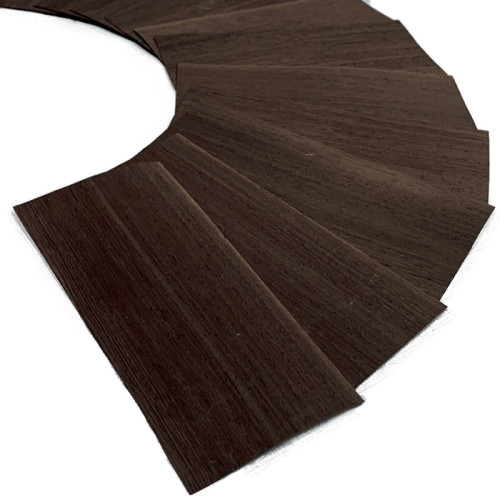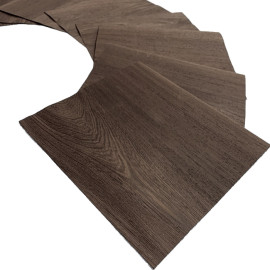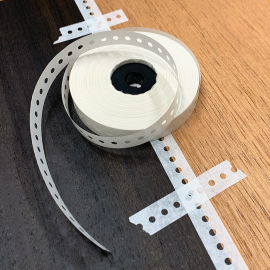
Wenge Small-size Veneers Narrow Width
Wenge Small-size Veneers Narrow Width
Genuine wood sliced-veneer sheets.
Selected single veneers, no sequence.
Fix length of 30 cm.
Width: From 10 to 14 cm, depending on availability.
Thickness: 0.6 mm.
Sold by the sheet.
Wenge Small-size Veneers Narrow Width
Genuine wood sliced-veneer sheets.
Selected single veneers, no sequence.
Dimensions:
Fix length of 30 cm.
Width: From 10 to 14 cm, depending on availability.
Thickness: 0.6 mm.
Sold by the sheet.
Measurement scaling:
The width is rounded to the covered centimeter: 15.8, giving 15 cm.
Photos:
To keep the cost of these products as low as possible, unlike other veneers on this website, the pictures of small-size veneers do not represent the available stock.
What are Small-size Veneers?
These are veneer sheets with a fixed length of 30 cm (exactly 30.5 cm).
These sheets are not in a continuous sequence and may come from different logs.
What is Wenge wood?
What are the shared names of Wenge?
Wenge, False Ebony, African Rosewood, and Awong.
What is the botanical name of the Wenge?
Millettia laurentii
What is the origin of Wenge?
Wenge wood primarily originates from Central Africa, with its heartland spanning countries such as the Democratic Republic of the Congo (DRC), the Republic of the Congo, Gabon, Cameroon, Equatorial Guinea, and Tanzania.
However, a cousin of wenge, Panga-panga, comes from East Africa. It's indeed a close relative of Wenge, often considered its East African counterpart, and is found in regions like Tanzania, Mozambique, and southeastern Africa. They share similar characteristics.
How to identify Wenge?
Wenge is a dark brown wood with delicate black veins, which is both very hard and crumbly at the same time.
It is a wood that must be matured and freshly sliced. The wenge is orange-yellow, and it will take its dark chocolate color only after maturing in a smothered state.
In quarter-cut, it offers a straight and uncluttered appearance. Its structure becomes much wilder in crown cut, highlighting the black veins that form the crown design.
What are the mechanical properties of Wenge wood?
Weight: Approximately 870 kg/m³ at 10-12% moisture content.
Janka Hardness: 8600 Newtons (for comparison, oak is 4980 N, and poplar is 1650 N).
Elasticity: 17.59 Gigapascals (for comparison, US maple is 12.62 GPa, and poplar is 9.75 GPa).
Crushing Strength: 80 Megapascals (for comparison, US maple is 109 MPa, and yew is 96 MPa).
What are the applications of Wenge veneers?
Wenge was used during the Art Deco period (1910-1939). Nowadays, it's a wood of choice for refined decoration, in contrast to lighter woods.
This species is used in decoration and furniture, as well as in musical instruments such as electric guitars, drums, and marquetry.
What are wood veneers?
Veneers are thin sheets of wood obtained by slicing or peeling.
Their surface has the appearance of planed wood without any finish or treatment. They are neither glued nor backed with any other material. This means that both faces of the sheets can be used.
Veneers are mainly used to cover less aesthetically pleasing substrates, such as plywood or particleboard, to create furniture or wall panels.
Wood veneers are also used to create decorative objects such as lamps, jewelry, bookmarks, and more.
By assembling several sheets of veneer on top of each other, it is possible to manufacture objects requiring high mechanical resistance, such as skis, bicycle frames, or musical instruments.
The applications of veneer are as varied as they are multiple.
Since veneers are genuine wood, all wood finishing products, including varnish, stain, and oil, are suitable. The choice of finish will depend on your personal preferences and the object's intended use.
The veneer offered here is a sliced sheet of uniform thickness, but the thickness might differ from one species to another. The standard thickness is around 0.6 mm.
Although the edges of the veneers have been cut roughly straight, they are not perfectly parallel to each other. Some veneers may retain the natural taper of the tree, being slightly wider at the foot than at the top.
Some veneers may have a slight wavy edge, one that follows the natural shape of the tree, on the sides. In this case, the indicated dimensions correspond to the minimum width of the veneer, as specified in the "Dimensions' paragraph.
How to use veneers?
How to cut the veneers?
Veneers can be easily cut with a utility knife.
For straight cuts, the best results are obtained with a veneer saw.
Use a fretsaw, scalpel, or veneer knife for curved cuts.
Always allow for a slightly larger veneer sheet than your intended surface. This will allow you to adjust the size after gluing for a clean finish.
A flush trimmer can also be used to trim the veneer after it has been glued.
When cutting with a utility knife or a veneer knife, it's best to cut with the grain of the wood. To check this, run your finger along the edge of the sheet. The direction that feels smoothest is the ideal direction for cutting.
What is veneer splicing?
Since veneers come in the width that nature gave us, you may need to cover an area wider than the available veneers.
Therefore, you need to splice the veneers by gluing or fixing them side by side with tape to obtain the desired width.
Trim the veneer's edges with a straight, smooth cut to achieve a good joint.
Stick the veneers in place with tape; the blue one is a good choice.
Usually, the veneers are spliced side by side, but to obtain a longer length, they can be done foot versus foot.
The splicing must be done before gluing the veneers on the substrate.
What Glue to Use for Veneering?
Several types of gluing are possible.
Vinylic glue, such as PVA or PVB, is well-suited for porous substrates like plywood, particleboard, or MDF. The veneers must be pressed with clamps over the entire surface at once.
Note: A technique using vinylic glue and an iron can also be used to glue veneers, but we strongly recommend using this technique only if other gluing solutions are not possible.
- Neoprene glue is applied to all surfaces, especially non-porous surfaces, using two coats of glue and marouflage.
- Animal glue, such as hide, sinew, or bone glue, is a product that must be cooked in a double boiler and used hot.
How to Sand Veneers?
Veneers and all our products are made from genuine wood and can be sanded according to the thickness of the veneer.
Please do not use a belt sander, regardless of the veneer's thickness, as it could pierce the veneer.
With a 0.6 mm veneer, lightly sand with 120-grit sandpaper and then finish with 180- or 240-grit sandpaper. With an orbital sander, 180 grit is already sufficient for most applications.
How to Finish a Veneer Realization?
All finishing products generally used for wood are suitable for finishing our products. For example, you can use a varnish, wax, paint, or oil.
However, ensure that the product you want to use is compatible with the final use of your creation.
More information:
Please look at our TUTORIALS; you might find some valuable tips.
Please contact us by email or phone for any additional information.
Data sheet
- Species
- Wenge
- Thickness group
- Standard
- Width group
- Narrow width
- Grade
- Quarter-cut
You might also like
 English
English








